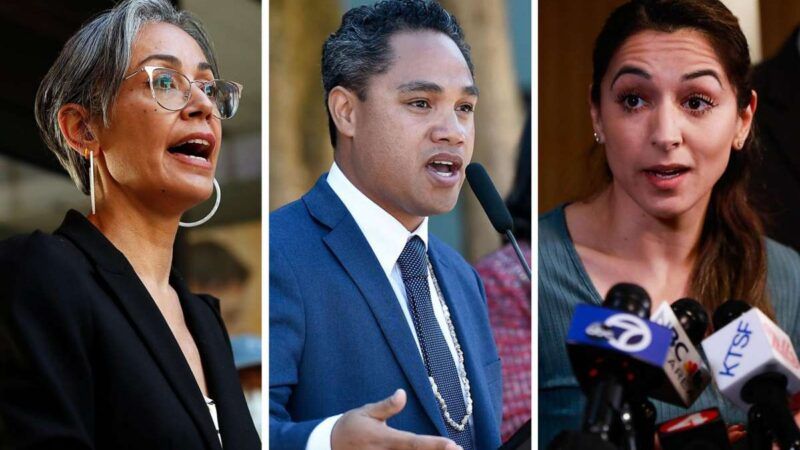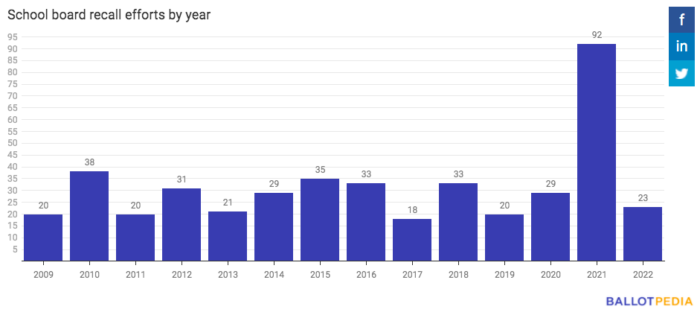Will 2022 Be the Year of the School Board Recall?
The 2021 pushback was about more than just the Virginia gubernatorial election, as the February 15 San Francisco recall will soon attest.

For those with moderately long political memories, and/or some built-in skepticism toward left-of-center depictions of political reality, the fall 2021 freakout over contentious school board meetings sounded an awful lot like the summer 2009 freakout over contentious congressional town hall meetings.
Both took place in the first year of a new Democratic administration replacing a Republican presidency that had soured at the finish line. Both were staged against a backdrop of sharp national crisis and upset. You had similar pundit assertions about the citizen pushback in question being rooted in either grassroots "white supremacy" (2009, 2021) or corporate overlord "astroturf" (2009, 2021); you had vastly inflated and journalistically repeated claims of violence (2009, 2021), heightened federal law enforcement alertness toward the potential dangers of domestic dissenters (2009, 2021), then a bit of an immediate tonal shift after a surprise GOP victory in a usually safe Democratic electoral contest (2010, 2021).
The size and scope of 2022's "parental revolt" is a topic of increasing interest and dispute. "Covid School Closures Won't Hurt Democrats in the Midterms, went one New Republic headline on this Rachel M. Cohen article this week. "The Democrats' Education Lunacies Will Bring Back Trump," counters Matt Taibbi, who has been doing some deep-dive reporting into the Virginia education controversies that impacted the surprise November election of Republican Gov. Glenn Youngkin.
The heightened parental interest in decision making at schools is already producing a wave of legislative proposals that could potentially curtail the use of controversial texts, as well as individual incidents like this week's removal of Art Spiegelman's classic Maus from the 8th-grade curriculum in McMinn County, Tennessee.
Time will tell who's more right about the political impact of the parent revolt, or the wisdom of the policies it produces. In the meantime, thanks largely to the work of Ballotpedia, we can at least preliminarily measure both the unusually high activity of school board recall efforts, and also the comparative drop in the ocean they still represent in the administration of these special-purpose government entities. First, the spike:

So that's 92 instances of people filing paperwork in 2021 to recall a combined 237 school board members in the 23 states that allow for recall efforts, smashing the previous post-2006 highs (as tracked by Ballotpedia) of 38 recall efforts targeting 91 board members in 2010. Seems like a lot, right? Well yes, and also no.
Fifty-four of those 92 initiatives never made it to a vote. Another seven were defeated; three led to resignations, and another seven (encompassing 22 school board members) led to nine no-votes, five resignations, and two defeats. Only one school board recall vote in 2021 led to a school board member being recalled—Lance McDaniel, one of seven members of the Montezuma-Cortez School District Board of Education in Colorado, who was bounced last February after constituents grew weary of the old hippie's social media posts containing such pronouncements as "I'm antifa."
To be sure, of the 92 filed school board recall actions of 2021, 22, covering 57 members, are either scheduled for this year or already underway. So 2022 could yet be the year to challenge 2010's record of recalling 25 school board members. (All the counting numbers should be understood as approximate.) So where are these challenges, and what are the underlying issues?
Three states have around a dozen local school board members each facing a recall this year: COVID-hammered Michigan, the education battleground commonwealth of Virginia, and the safe Democratic state of California. Most spring from disputes over pandemic-related policies, with a sprinkling of personal behavior thrown in, plus concerns over critical race theory (CRT) in Loudoun County, Virginia, and Tustin, California.
The splashiest recall case by far is scheduled for February 15 in uber-progressive San Francisco, where three of the seven board members—Alison Collins, Gabriela López, and Faauuga Moliga—face removal after having failed to open schools full time for more than a calendar year, a period during which the district made national headlines for voting to change the allegedly problematic names on 44 of its buildings.
Recall opponents are trying to take a page from Democratic Gov. Gavin Newsom's successful defense against his own attempted voter removal last year—pin it all on conservative and possibly Trumpy opportunists, including shadowy Dark Money outsiders.
"When there's this much money behind a special election, it's worth looking at who's behind it," Collins told The Washington Post's David Weigel earlier this month. "I've never seen this type of energy and this much money involved in a special election. It's an opportune moment for folks who want to privatize public education, because right now, teachers are really suffering. It's an educational emergency right now."
Added anti-recall organizer Brandee Marckmann: "It's a moderate/conservative power grab….I can see why sleep-deprived people are really easy to co-opt into a parents 'reopen' movement. But it's not just about keeping the schools open. These people are basically trying to take advantage of parents."
False-consciousness arguments are always a political hard sell, particularly when one of the biggest supporters of the recall is none other than Democratic Mayor London Breed ("Sadly, our School Board's priorities have often been severely misplaced," Breed wrote on Facebook in November, adding: "It was clear from the start that this recall effort was a grassroots effort led by parents; that's who got out there and collected the signatures. I am supporting the parents' call for change").
So far, unpredictable political things have happened in places where motivated parents no longer have even the ghost of former President Donald Trump to vote against anymore. And it's worth remembering that the recall mechanism is one of the rarest electoral tools in the shed.
The normal stuff of school board elections, and noisy meetings, is where much of the action will continue to happen (in addition to competing state-level bills dealing with pandemic school response, CRT, and curriculum transparency). In November, fewer school board incumbents ran for reelection, a lower share of those incumbents won, and a higher share of candidates ran on an explicit anti-CRT platform, according to Ballotpedia.
We are talking about numbers in the low hundreds, in a country with an estimated 13,800 school boards. The normal stuff of boring civic life is undoubtedly still mostly normal and boring.
But pandemic K-12 policies in Democratic-run U.S. jurisdictions negatively impacted kids and families in searing, hard-to-forget ways that were largely out of step with the rest of the world. To the extent that Democrats and progressives try to dismiss these intensely held feelings among a subset of voters (many of them longtime Democrats) as either mistaken, manipulated, or manufactured, during a midterm election swinging reliably against the president's party, is the extent to which they are going to be in for more unpleasant political surprises.
Meanwhile, as more previously apathetic taxpayers look under the hood of government-run schools, they are not going to like what they see, and will seek to make changes. It's not hard to see how those efforts, too, may lead to some unwise school policies.
At this the end of National School Choice Week, it's worth reflecting on one of that concept's highest-order virtues: creating smaller-scale units of voluntary affinity, rather than relying on increasingly distrustful families, teachers, administrators, and taxpayers to hash out what works best in a one-size-fits-all system for students.
Show Comments (16)